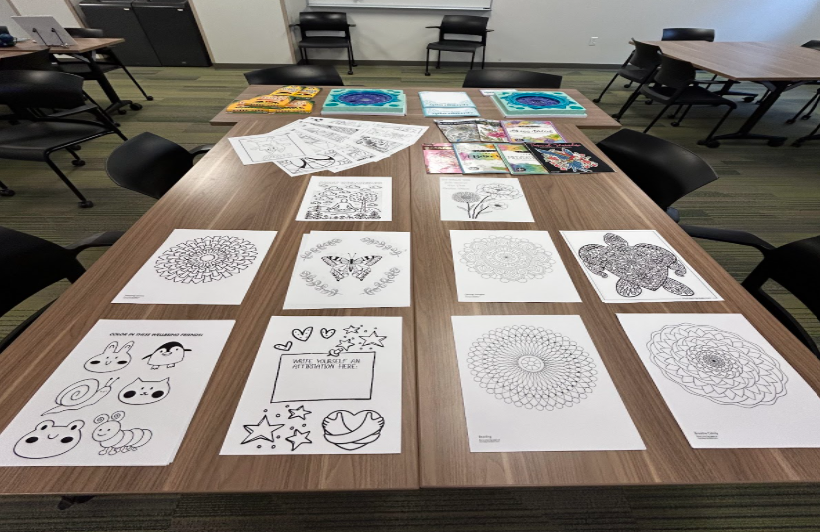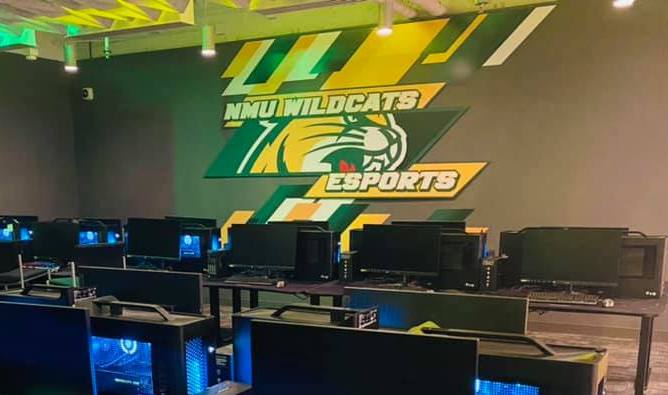Sports in college often originate from clubs. When a sport grows enough in popularity and gains recognition from the school they can become a certified sport. Esports at NMU began as a small club of gamers who were seeking to have fun and compete with their friends. Head coach of both the “League of Legends” team and the “Smash Bros. Ultimate” team, William Garetto-Balmer, shares how esports continues to grow once accepted by a college.
“With esports coaching out of college you aren’t allowed to be good at coaching at just one game. You have to know lots of games; you can’t be a single specialty. This year I focused on my two specialties—’League’ and ‘Smash.’ I’m also starting to branch out into games I have experience in, but less special skills,” Garetto-Balmer said.
This semester Garetto-Balmer has said that they have added “Counter Strike: Global Offensive,” or CSGO, as a temporary game to the roster. Next semester he is considering adding CSGO as a permanent game for NMU esports, and “Rocket League” as a temporary game.
“While we are starting small and [students’] games might not be chosen, that doesn’t mean it’ll be that way moving forward. We want everyone to feel included and come into our facility when COVID-19 is over,” Garetto-Balmer said.
As a former tennis coach at Western Michigan University, Garetto-Balmer has experience in both physical sports and esports. The main difference between the two is team structure. Students coming from playing games on their own to learning how to be a team is a stark contrast from the typical structure of physical sports.
“Right now the team is excelling at just being a team in the sense that they’re all friendly to each other and they all get along. They’re all wanting to learn and improve,” Garetto-Balmer said.
Garetto-Balmer is not the only member of his team that has experience in both types of sports. Austin Berquist, Gamertag ‘Not In My House’ and a junior majoring in computer information systems, is a member of the NMU football team and a formidable player on the “League of Legends” team.
“The difference between the two sports is one is a full contact sport and the other is non contact. We can do everything we need for esports unlike how in football we have to be close to one another and require a lot of COVID-19 tests to participate safely.”
Berquist was not part of an esports team prior to joining NMU’s team. Despite the adjustments to a team structure they have been doing quite well, harboring two third place finishes early on in the Michigan esports conference. In CSL the “League of Legends” team held a record of 3-1, and has now entered college “Leauge of Legends,” starting with a record of 1-0, according to Garetto-Balmer. Their next game will be this weekend against University of Indiana, Bloomington, seeded at 11th.
For students interested in esports, Berquist suggests a straightforward approach to get coaches’ attention.
“Put your name out there. I contacted the football coaches constantly until they decided to look at me and I got my shot. The same went for esports. I contacted Beg and he gave me the opportunity to try out. Make sure you have experience in esports and have confidence that you can compete at a next level and go for it.”
While the “League of Legends” team has had much success in tournament setting, the “Smash Bros. Ultimate” team has run into obstacles due to COVID-19. Landon Iodice, Gamertag ‘Victoryeye,’ a senior majoring in forensic biology, shares how latency issues have restricted practice time.
“COVID-19 has heavily impacted ‘Smash.’ We had a big tournament called Blizzard that was supposed to be a collaboration with Tech and LSSU. We were getting people from outside Michigan to join too but COVID-19 happened. Because of this problem with face-to-face it’s been hard to adjust to online because that’s our only way of competing now,” Iodice said.
“Smash Bros. Ultimate” is known for its poor servers and lack of first party support for tournaments from Nintendo, the publisher of the game. This has led to a difficult time for the community, causing tournaments to be laggy or non-existent. Despite this, Iodice still has a strong love and passion for the game, having grown up playing previous installments like “Smash Bros.” for the Nintendo 64, and “Smash Bros. Brawl.”
“At first I played as intended just to play with friends and stuff like that. One day a friend of mine came up to me with ‘Brawl’ and we got so invested into it that when I got into middle school and highschool it developed into something we’d play every single time we’d hangout. Now it’s a sport I practice often.”
Although he hasn’t been able to compete in awhile, Iodice said that he prepares for tournaments by focusing on his mentality and composure. As a former martial arts competitor, the mindsets are very similar, according to Iodice.
“Momentum is a huge deal. Before a tournament I try to rest, not practice super hard and watch some film,” Iodice said.
“Smash Bros.” tournaments have seen a surge of interest in the past years. With a roster of over 70 characters, it can be hard to choose who exactly to enter a match with.
“Right now—my main has switched all over the place since day one—Greninja. I secondary Robin with some pocket characters like Pichu, young Link, and Pikachu,” Iodice said. “In terms of my favorite player, I’d say eSam. My other is Zachrayi from Japan. Those are my two absolute favorites to watch.”
Students interested in joining the esports team can contact the head coach at wgaretto@nmu.edu. “Smash Bros.” is also running tryouts this week until Friday, Jan. 29. NMU esports also has a Discord server open to all students. Those interested in joining can also email Garetto-Balmer.
To watch this weekend’s “League of Legends” game, go to twitch.com/dontaesinferno, and to keep up with Iodice’s practice, find him on twitch at twitch.tv/Victoryeye17.































